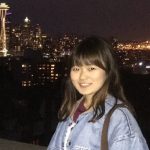Home University: Tokyo Institute of Technology
Field of Study: Applied Chemistry
Status: B3 Expected Graduation: March 2019
Research Host Lab: Prof. Jeffrey Hartgerink, Department of Chemistry
Why Nakatani RIES?
I have been eager to try myself in unknown places through my academic studies. Rice University is known for the high-level engineering, and learning and communicating with people there will greatly inspire me in many ways.
Now in the world, there are many problems in global business. The causes of them are so complicated and have many aspects. It is necessary to cooperate with people worldwide to tackle these issues. Studying and discussing with smart students in Rice will have great impact on me.
Goals for the Summer
- Communicate with people in English fluently.
- Make presentation confidently in English.
- Overcome my shyness and be able to ask questions or give opinions in public.
Excerpts from Ayaka’s Weekly Reports
- Week 01: Arrival in the U.S.
- Week 02: First Week in My Research Lab at Rice
- Week 03: Interview with a U.S. Researcher
- Week 04: Reflections on English Language & Life in the U.S.
- Week 05: Research in the U.S. vs. Research in Japan
- Week 06: Final Week at Rice & Research Poster Presentation
- Week 07: Visit to Lehigh University & Return to Japan
- Final Report & Tips for Future Participants
Week 01: Arrival in the U.S.
Prior to departure, we had an opening ceremony that included two sessions in Tokyo. The first, was given by Prof. Shinichi Nishikawa, on the theme of “Life science as a major agenda for 21st century”. Following theories by Descartes, Darwin and so on, we learned history of science and got tips on what we should in the 21st century. He said that the way of thinking about science is progressing day by day. The idea of the progress of science was kind of new to me because I thought science (like physics, chemistry, biology and mathematics) has a been consistent considered and thought of the same way up until now. Understanding of this history of science was extremely helpful for me to understand the outline of my lab project later at Rice University.
After that, when we had lunch with Prof Nishikawa and he told me the characteristics of those who become professors while they are young. They tend to write good quality papers, take advantage of good opportunities, and they should be able to make friends with various people. I realized that it is not only the ability in specialized fields but also that of communicating well with people that will be important in life.
The other session was by Prof. Yoshichika Iida, on the theme of “Transferable Skills Development for PhD ”. Actually, I had never thought of going on to PhD so much before participating in this internship. However, I learned that a PhD is essential to work as a researcher abroad. Since I would like to work all over the world in the future, I realized I should also consider going on to PhD. He said transferable skills are necessary not only those who remain in academy but also everyone else. As Professor Nishikawa said, communication skills are required here as well.
- It may also be interesting for you to review the section on ‘Applying to Graduate School’ and ‘Career Resources’ on our Other Related Programs page.
After the Opening Ceremony ended and a 10-hour flight, we finally arrived in Houston. It’s terribly hot and the sun is strong. Everything, like the cars and the people, is big and I felt “the U.S.” as soon as I arrived. It makes me excited even though it was not my first time in the U.S. I’ve only been to big cities such as NY, LA and Seattle. I had a stereotypical image of Houston like there would be cowboys. Besides, Texas is a big state, so I thought it would be rather slow to develop. However, Downtown was prosperous and, of course, our hotel was clean and really comfortable.
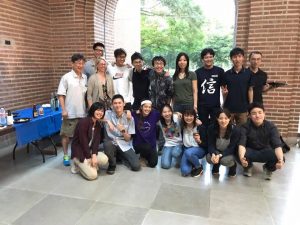
The next day we went to Rice University for the first time. The campus was beautiful and dignified, so I was overwhelmed. I was very excited about going to this school for about a month. Prof. Kono and Sarah gave talks during this first week. Prof. Kono gave advice on how to spend 4 weeks for and how to prepare for the poster session. He said that it is important to grasp and learn the overall goals of the research that the laboratory is working on rather than trying to put out the excellent results in just four weeks. This talk was really helpful for me to understand the way of conducting research because I have not belonged to any lab yet.
Sarah talked about “building cultural bridges”. Not only the U.S. or Japan but also every country has a different culture. For example, there is “small talks” in the U.S. and “looseness of time” in India. That is all about culture. Especially during this internship period, I want to tackle any situation with a positive attitude and open mind and with the attitude of saying “yes”. (I do not want to eat strange insects, though.) At last, the most important thing is maintaining curiosity. Having interests and curiosity is important not only for research but also for daily life.
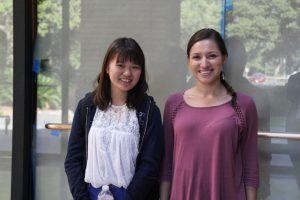
I think that with this aspiration some language barriers can be overcome. I‘m eager to learn various things from the lab members to show them my enthusiasm.
On Thursday, I met my professor and the lab members. This lab conducts the research about connecting basic science, like peptide synthesis, to applied science uses in medical care. My professor encouraged me to “see all and do some”. As Prof. Kono said before, I understood again it is important to grasp the overall research goals of my lab. The lab members are all kind to me and asked me many questions. They talked to me a lot and explained about the research they have recently conducted. I am lucky to be a member of this lab even for a month.
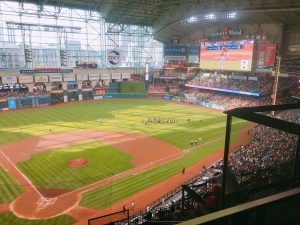
Finally, my first weekend in Houston arrived. I went to see a Major League Baseball (MLB) game with some of the other Japanese fellows. The baseball rules were taught by Nina and I enjoyed it. Of course, everyone in the hall supported the Houston Astros. When they won, everyone was delighted and the atmosphere was awesome.
I love this American culture that they are always proud of their country, state and team. Anyway, everyone I met are really nice and friendly with a big smile. I’ve become totally fond of Houston!
Question of Week
I used the Houston Metrorail when heading to the stadium, but there were not so many people, the inside of the car was dirty, and the security was bad. When I was in Seattle, everyone including the students was using the bus. It was really developed and very helpful. Is the public transportation different from state to state?
- Yes, in the U.S. how developed the public transportation networks are can vary a lot. Seattle and Portland are known for having particularly good public transportation that it is very clean compared to other cities. If you travel in other major cities with well-developed train/subway networks in the U.S. you may find it is more similar to Houston (not as clean).
- Also, the volume of riders on public transportation in cities in the U.S. depends a great deal on how dense the population is and how expensive it is to own/park a car. In Houston, land is very cheap and it is easy for people to buy homes or live in apartments where there is free and easy parking. Therefore, most people in Houston drive their own cars and since the city is so large (by size) it also means it is not very densely populated. Therefore, currently there is only a light-rail in the central city areas (where it is slightly more densely populated) and it is very slowly starting to expand outwards.
- Many people in Texas and Houston prefer that the state and federal government invest in improvements to freeways and streets, rather than light-rail, because, again, most people already have cars and prefer to drive. It will take time to change this culture in Houston I am afraid.
- Why the U.S. Has the Worst Public Transit Systems (Video)
- For more, see the section on Public Transportation in the U.S. on our Life in the U.S. Resources page.
Preparing to do Research in the U.S.
Before coming to the U.S., I read two papers sent to me by my professor in advance. Because I could not remember much about peptides, I studied about that using books and the Internet and deepened my understanding.
Since my communication with the professor and mentor was primarily a self-introduction, I did not know details about my project/topic prior to arrival. I think it is important to read papers from your research group. Moreover. I think that it is also important to study oneself so that we could confirm the basic knowledge.
- Great tip! If your host lab sends you articles to read prior to arrival you can also email them or ask if you can have a Skype meeting to discuss any specific questions you have about the papers you have read. That way they know you are actively reading the articles and by asking questions about the paper it can provide opportunities for you to begin to discuss your possible research project even before you arrive at your host lab abroad.
Week 02: First Week in My Research Lab at Rice
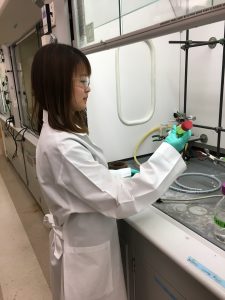
I’ve worked on research from this week in earnest. The study I’m now conducting is peptide synthesis. My knowledge of peptides is still at the high school level and I’ve never studied solid-phase peptide synthesis before. Therefore, I couldn’t understand what my mentor explained to me so much at the beginning. For example, I needed to swell resin at first but I had no idea about why swelling the beads that is made of resin is needed to synthesize peptide. However, as I asked my mentor questions and read some textbooks, I came to figure out the series of this experiment little by little. The peptide which I synthesized this time is made up of 23 amino acid and I managed to do coupling with 18 amino acid at the end of the week.
My mentor is Nicole who is very kind and can answer any questions I asked, but she is extremely busy so everyone else in the lab has also kindly helped me as well. I-Che, who is from Taiwan, had so much curiosity about me and Japan and talked to me a lot. His wife is also working at Rice too, so we three had lunch together on Tuesday. I ate a California roll that I had wanted to try for a long time. It’s quite different from Japanese sushi but it was still good and I liked it. Tania who is from Mexico is like another mentor for me. She helped me and explained theory to me when I failed to synthesize peptide. Moreover, she took much care about me and sent me messages when hurricane came that I will talk about later. Besides this, some of the lab members told me enthusiastically about their research and told me that they like Japan a lot. I appreciated them so much and was surprised to know how they are curious about Japan.

Everyone is awesome, so sometimes I was frustrated with myself for that. I have many things to tell them, but I couldn’t come up with the words easily. Even if they talked to me a lot, I sometimes could understand only some parts, and I didn’t communicate much like “the word catch ball” only saying “aha”. I think it could be much more fruitful if I spoke English more fluently.
When we had lunch with Dean Seiichi Matsuda, even if I was able to introduce myself or talk about my hobbies, I couldn’t catch up with the more academic conversation. I always felt frustrated.
On Thursday, we had a session about strategies for vocabulary acquisition. Our speaker was Kyung-Hae Bae, and she highly recommended to make our own vocabulary list of terms that we couldn’t remember. Even though I thought I had learned the new words, I often found I couldn’t remember them. My English vocabulary well has not been filled up well until now. I found that it was not until I wrote down the words I can’t remember and looked them up many times that I truly learned those words. In the next four weeks, by increasing my vocabulary, I’m going to make my effort to achieve one of my goal of this program “communicating with people in English fluently”.
We also learned how to make the final poster presentation on Tuesday. Dr. Gayle Moran told what is basically required on the final poster. She also gave some tips about what is good poster like the contrast of colors or the size of white space. More than anything, her attitude of speaking clearly, dignified and understandably is the best model that I wanted to acquired. One thing I’d like to know about is how to make methods summarized because my research consists of many steps. Trying to write every method of the step, it must be complicated.
We had some activities other than research or session. On Wednesday, we went to Houston Museum of Natural Science. There are various exhibits, so I enjoyed all without getting bored. I’m especially interested in Antarctic creatures and dinosaurs so I was really excited. We had been planning to go to NASA this weekend, but Hurricane Harvey unfortunately has come. At first I was actually a little excited because it’s the first time to see hurricane, but everyone else except Japanese fellows were really serious and ran into the grocery store and bought like tons of water. I thought they were a kind of crazy and just wondered whether it is devastating. I felt differences on natural disaster between people in the U.S. and Japanese. That’s because there are many disasters in Japan like typhoons or earthquakes. In my opinion, hurricane would be still better because it could be predictable to some extent. Anyway, I will have to stay at hotel this weekend and have to read papers and understand my research deeper.
Question of Week
Is it that unusual that natural disaster occurs in the U.S. or was it just terrible one?
- This is a very unique situation and is more rain and flooding than Houston has seen in the past 500 years. While there can occasionally be street flooding in Houston after a heavy rain storm, it typically recedes quickly and things go back to normal. This is because the water table in Houston is very high, so the ground cannot soak up a lot of water and therefore the bayous (streams) are designed to quickly move water south of the city towards the Gulf of Mexico.
- Right now, there is simply nowhere for the water to go because there has been so much rain throughout the region so quickly. However, it is very impressive that given the massive amounts of rain the power and water supply has largely remained stable throughout most of Houston. The City of Houston and Harris County continue to work closely together with the Government of Texas and federal officials to respond as quickly as possible to this situation. They are focused right now on immediate emergency needs of citizens in badly flooded areas but in the weeks ahead will turn to recovery and relief efforts throughout Houston. This is an unprecedented rain event that is like nothing the city has ever seen before.
- We are sorry that it had to occur during the program schedule but we are so glad that you and the other Japanese Fellows are in a safe area where there has been minimal street flooding and in a hotel where the power and water have remained stable and that has a back-up generator. At this time, all we can do is wait and watch the regular updates posted on the Rice Emergency Management website and hope the rains will end soon so the city and region can start to heal. Though Rice University campus itself has not flooded, many of the faculty and staff live throughout the Houston area and they may be dealing with flooded homes or they may not be able to safely travel to campus yet due to flooded streets.
- Please be patient and try to keep in good spirits. No one could have expected such a storm as Harvey to have occurred. It truly is a 500-year storm.
Research Project Update
Peptide that is synthesized now is E2(SL)6E2GFLPASGL.
Since solid-phase peptide synthesis is carried out, so beads called resin are required as well as amino acid. To synthesize correctly in this order, it is necessary to use amino acid whose N-terminal is protected. Then we need to deprotect when synthesizing. For deprotection, we use a mixed solution of piperidine and DMF-DMSO. For coupling, we use HATU as activator and DiEA as condensation agent.
After synthesizing, it will be purified and characterized by Mass spectrometry, CD, IR and Rheology. I expect that specific spectrum appears obviously.
Through this research, we hope to prove whether it is bioactive or not and how wound closure occur when injected to mouse. We estimate it will take a week for each step such as synthesis, characterizing and demonstration.
Week 03: Interview with a U.S. Researcher
I interviewed Tania who is one of my lab members and from Mexico. I was curious about 3 points of her experiences and thoughts.
The first one is “Why you did you decide to come to Rice?”
Her degree is Bachelor of Science in Chemistry from Tec de Monterrey, Mexico. She has been involved in science since she was in middle school. She decided to be a scientist when she was in high school and chose chemistry because it allowed her to be trained in a multidisciplinary area. After her undergraduate studies, where she had the opportunity to work on materials, she decided that she wanted to use chemistry to solve health problems. Rice University is leader in nanotechnology and materials for several applications. Moreover, Rice provides excellent instruments and research resources to make progress faster and efficient. That’s why she came here and attending graduate school at Rice has given her the opportunity to expand her knowledge and to use chemistry to contribute in tissue regeneration.
The second one is “What are you going to do after getting Ph.D.?”
As she described above, she has been eager to be a scientist since in her teens. After getting her Ph.D. , she would like to work on health research in hospitals or industrial companies.
The last one is “What do you think about the internationalization of research?”
She thinks internationalization is important in the professional and personal development not only for researchers, but also any profession. She said internationalization gives you the opportunity to explore other cultures and learn the best of each. She said also it facilitates solving problems because you share different perspectives and ideas that are derived from the cultural differences. It is a different and more challenging environment in a foreign country because she has to focus not on research but also on language and cultural aspects of her work. Communication is efficient but requires more energy than her native language. She said you have to have a lot of resources as an international student to explore and use to develop your professional skills, and also it is gratifying to contribute in problem-solving with other ideas or skills you learned in another country.
When I interviewed with her, I was really overwhelmed by her enthusiasm for research. She has been eager to learn chemistry since she was in high school and now she is going to get a job based on her scientific skill. She also mentioned that her undergraduate school was more focused on collaborations with industry. Otherwise Rice is a leader of nanotechnology and materials, so resources and opportunities here differ from her previous university.
As long as I listened to her story, she doesn’t seem to be unsatisfied with school in Mexico. She sought to find new opportunities and different thoughts derived from different environments. It’s always challenging to be placed in completely new surroundings, but it surely gives us a new encounter and thoughts coming up in your mind. She has been at Rice for two years, and now plays an active role as one of the lab members. I’m inspired by her a lot.
One thing that I become curious more is her career in future. She said she wanted to work in hospitals or industrial companies. I wonder where she is going to work. I think she is going to work at the best place that she could do what she wants wherever that is like in her hometown or any other country. I just want to keep in touch with her and trace her future career.
Research Project Update
I could not go to the lab at all this week so I read papers and understood deeper about the mechanism of synthesis that I’d worked on.
Next week, I hope to complete all amino acids synthesis and cleave from beads and purify it.
Volunteer Experience
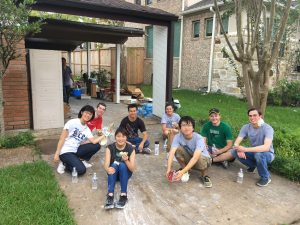
As you know, Hurricane Harvey hit Texas this week. Since I did not want this experience to be a wasteful one, I would like to share my volunteer experience instead of a research update.
Harvey brought Houston the flood like once every 500 years. While being stuck in the hotel, I found that the damage was devastating watching reports on TV or on the internet. Fortunately, since the sea level around the hotel and Rice University is high, the power had not gone out and the damage was small.
On Saturday, when the flood ceased and the damage had settled down a bit, I worked on volunteering with the Rice Harvey Action Team (R-HAT). We broke and dried the wall of the house whose 1st floor was almost wholly flooded. Since the house is made of wood, the strength gets weaker if it is left wet. It was quite difficult and time-consuming that we broke down all the walls in the large house. I felt like just I was just devastating it instead of repairing the house; but the walls had to be broken down so the wooden wall studs could dry out.
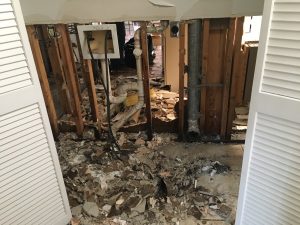
The owner of this house is from China and has moved here just 2 months before. Their son was going to Rice and currently working somewhere else. I’ve been keeping in touch with him and he tells me restoration is still going on. It would take a long time to be back to normal. There were lots of things I felt such as the seriousness of the affected people, the situation and smell of the affected areas which I could never know about just by watching TV. The local people who volunteered together were really kind and friendly and I was inspired by their spirit of contribution to someone. People suffering from the disaster must have much anxiousness. At that time, it may bring about relief that people who they have never known visit, help and talk to them. Actually, this was my first time to participate in volunteering. Even though my contribution was a little, I hope and pray that Houston will be back to normal as soon as possible.

Anyway, it was sometimes too hard to stand this situation being stuck in the hotel. However, by the end of the week, my new Chinese friends showed us around their college and campus such as the architecture room. There were many new encounters and findings. My family and friends in Japan was worried about me a lot, but it was a definitely fulfilling week.
Question of the Week
I think there are many kinds of races in Houston, especially Chinese I’ve seen like everywhere. Is that specific feature of Houston?
- Yes, as you learned during the webinar talk by the William Fulton of the Kinder Institute, Houston is one of the most diverse cities in the U.S. To learn more about diversity in Houston see the following:
- How Houston has Become the Most Diverse Place in America
- Houston’s Diversity is America’s Future
- What Makes Houston the Next Great American City?
Week 04: Reflections on English Language & Life in the U.S.
Research in my lab finally restarted this week. I desperately did my research to get back my progress after last week. My mentor Nicole had returned to her parent’s home in California to escape from Harvey, so we finally met on Wednesday afternoon. I was really happy to see her.
Peptide synthesis finally came to end and we proceeded to the next step. As I had a lot of complicated work, I always had to be careful not to miss my mentor’s instructions. Everyone is so kind that they listen carefully to what I say slowly in English. I have started to understand almost fully what the person says when talking on a one-to-one basis. Yet, when it comes to speak up myself, I still can’t come up with the appropriate words smoothly or a sentence would be a messy one.
In addition, I can hardly understand it when lots of chemical terms come out. Although my mentor said “sucrose” many times, I couldn’t understand for a while. That’s because pronunciation of that is completely different from Japanese one. I asked her what it was, she told me that was a sugar. Finally, I got it.
Moreover, when it comes to chating with several people, I sometimes can’t keep up. I know it is necessary to get used to it, so I’d like to get in touch patiently.
Fortunately, I have a good model to follow. Ohata-san who is Seiya’s mentor in the lab next to mine always makes other American students laugh in English. I think it is amazing. To communicate deeply with foreign people needs not only skill of language tools like English but also one’s solid personality.
Therefore, the following three are what I always keep in mind to improve my communication skills including English ability.
- Show my enthusiasm
- Always keep smiling
- Ask at least one question per day
The first one is the most important thing for me who sometimes cannot convey well in English. When I finished working on synthesis and found my peptide was actually what we wanted, my mentor said “Great job! You were working hard on synthesis!” I was really relieved and so happy to hear that because I felt like my efforts were being acknowledged. English is essential to communicate without saying, but to express myself other skills are necessary as well. If you showed your motivation for something, various people would talk to you, show an interest and could discuss about it for each other. There must be much communication coming out from the common point that we are the same “chemistry lovers”. I think my English communication skills will surely improve as I have these good opportunities.
The next one is necessary not only in the U.S.. I think those who keep always smiling could get chances easily than closed-minded ones. For example, conversations like “How are you doing today?” would be held everywhere such as in elevator or bus if you behave cheerfully and are not exhausted.
The third one is quite simple and my daily goal. As I am still puzzled, being talked to suddenly, asking questions is a good way to start conversations at my own pace. The questions could be about private things or research and I’ve learned a lot of vocabulary and idioms from that.
Anyway, when I couldn’t keep up with their chatting, I felt really frustrated. Even though there are many good opportunities to hang out with friends in Rice and I have a lot of things to tell them, I become less talkative. English communication skills would not be acquired immediately, so I’d like to find chances to speak it in Japan as well.
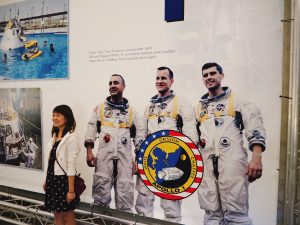
On Saturday, we headed to NASA: Space Center Houston which had been postponed. I was really excited and overwhelmed all day. According to the staff, when the Apollo was launched, the computer had not been developed as much as that of these days at all. There are a lot of screens which are not computers but just data monitors. In fact, the personal computer hadn’t been invented yet, so the only computers that they really had were extremely big ones like in our lab room. They had few of them but it’s capacity was really small which was almost equal to that of 3 or 4 pictures taken by cell phone. The staff said we could run all the Apollo missions off of our cell phone. I thought this place was the most full of dreams in the world because I could not have hit up on the idea like going to the moon in such a time.
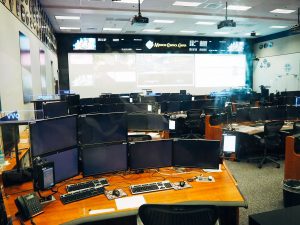
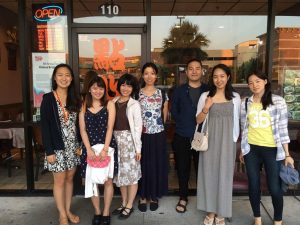
That evening, Natsumi-san (a graduate student in Rice) invited us to dinner. As Chinese, Korean, and Japanese students gathered, the cultural differences among Asia was really interesting. I thought what an awesome coincidence that people who were from different countries in Asia met up and had dim-sum together in the U.S. which is approximately the back of the earth from Asia.
On Sunday, we had Texas Barbecue that we had been longing for. I cannot believe we only have ten days left in Texas. We’ll definitely miss Texas soon.
Research Project Update
We finished synthesis of 23 amino acids and cleaved it from beads. I’ve already run mass spectrometry to confirm the success of synthesis. Then we went on to dialyze and purify it.
Next week we are planning to proceed to characterization by running CD and IR.
In addition to this peptide which is called E2 mimic, we’ll make hydrogel from E2, K2 and K2mimic to run Rheology and compare the results.
Question of the Week
My aunt who lives in LA send me some pictures of NASA in California. NASA seems to be located in other places in the U.S. as well. What is the specific feature of NASA Johnson Space Center? Is there any difference from other NASA?
- Yes, the National Aeronautical and Space Agency (NASA) has locations all throughout the U.S. that do different things. In Houston, at Johnson Space Center, astronauts train and live and where Mission Control is located. Kennedy Space Center in Florida is where they launch the shuttles into space and when they return to earth they often return to California. The Marshall Space Flight Center in Hunstville, Alabama is looks at space flight and where the NASA Space Camp for kids is hosted as is The Langley Research Center in Virginia (where the move Hidden Figures is set) and the Jet Propulsion Lab in Pasadena, California is where they do research and build unmanned space vehicles, such as the Mars Rover, and satellites (Prof. Kono and I know a Rice alumnus who works at JPL). And that is just off the top of my head… to learn more about NASA facilities and what they do see the following:
Week 05: Research in the U.S. vs. Research in Japan
I experienced what actual life in the lab in the U.S. is like through this internship.
Though I’ve never been in the lab in Japan yet, it is always said that chemistry labs are particularly tough due to time restraints. In that respect, I think ones in the U.S. are relatively more flexible but of course, it depends on people. One of my lab members seems to be in the lab all the time. Since graduate students in the U.S. are literally hired by professor, it would be possible they couldn’t get Ph.D. if they don’t get good results. Therefore, it’s really competitive and serious.
I don’t mean that graduate students in Japan are lazier than in the U.S. though. They are also working hard and struggling to get a good result. I think wherever I stay, all I have to do is the same. Just do my best.
However, as Prof. Kono told us in the orientation, the number of Ph.D. candidates in Japan is drastically decreases while that of other Asian countries increases steadily. Due to the problem of falling birthrates and an aging population, the national strength of Japan is gradually declining. Under such circumstances, it is hard to think of working only in Japan. Most of all, it is fun to know and experience different places, cultures and customs. Moreover, there are a lot of problems that we should combat on global scale. I want to contribute myself to solving those kinds of problems in the future. To achieve that, it is nothing but a plus to accumulate experiences overseas in my youth.
For that reason, this six-week stay Houston and at my Rice University lab was very fruitful and meaningful. It is always hard and difficult to discuss the specialized contents about research, but it has been a really fulfilling life so far. Even after coming back to Japan, I am going to keep it up and improve my expertise. I want to strive to be treated as a researcher rather than a “visitor” the next time.
Even though I’m not sure whether I will work as a researcher or something else, I do understand that communication skills are necessary. Through this internship, I found that communication skills are not limited to language ability. In order to be acknowledged in the true meaning, it is important how much expert knowledge I have to discuss. To do research and work at an equal position, I think there are many other elements that are required. I’m not sure whether I will go on to graduate school in the U.S., but I want to return here for studying or working.
At last, I’d like to appreciate the perfect surroundings in Houston. My lab has the best atmosphere. As there are not so many people, everyone is cooperating with the consistent project. They all seem to be very busy, but they always cherish each other’s communication and reporting on each other’s achievements and failures as well. I realize that even when research makes us lonely, by valuing communication, the atmosphere would be better and perhaps research would get better.
Even if my stay here is limited to just six weeks, I enjoyed going to the lab. I cannot thank them enough for taking care of me.
This weekend, we headed to Rive University vs. University of Houston football game. I had been longing to watch it, so my wish has come true finally and I really enjoyed it; though Rice owls lost the game completely with a score of 38 – 3. I’m not quite sure of the rules, so I ended up with vague understanding. I’d like to try again with more firm knowledge about it.
On Sunday, Aki-san invited us to her house. Aki-san works hard in English and she looks really powerful. I adore her a lot. From experience until now I know when I found a person I adore, I was inspired a lot and could try harder to reach him/her. I am honored to meet many Japanese women including Aki-san here in Houston who I admire.
I can’t believe we should leave here in the next week. Time flies. I’ve been to the U.S. several times, and every time I came here, I become fonder of it. I think of lots of dreams everywhere in the U.S. even at the grocery store.
This was my first time to come to Houston, so I was able to find a further aspect of the U.S.. People in Houston are very friendly. They smiled each time they passed by and opened the door for the person behind. I was able to see this kind and gentle aspect.
I love American culture, townscape, food and people, so I absolutely will miss them all. Especially this time, as I was really blessed with the environment in my lab, I’m very sad to think I cannot meet them anymore.
Week 06: Final Week at Rice & Research Poster Presentation
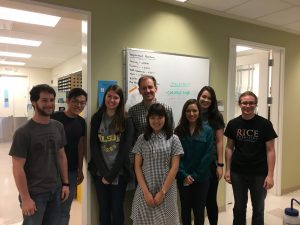
I focused on only research this week. We purified E2 mimic which had been synthesized last week by dialyzing to remove TFA and scavenger which was used for cleavage. Then I dried it into the powder and put sucrose and HBSS in it to form hydrogel. In characterization, to compare the results, I run CD, IR and Rheology with not only E2mimic but also E2, K2, K2mimic as well. After the results come out, we marked them on the graph.
Although E2mimic became a really weak hydrogel, comparatively I managed to get a better result than we expected. Even though my mentor, Nicole, was extremely busy writing a paper, she always paid attention to me and gave some tips for poster presentation. I really appreciate her kindness.
Almost all the experiments are done. Only Rheology of E2 should be done again since the different results came out. I could only do until characterization but my project cannot be accomplished without in-vivo experiments. Nicole says she will take over it and definitely let me know about the results.
I think in my department there are few labs that conduct clinical experiments, so I’m not sure whether I’m going to be involved in this field in the future. Designing peptides and making a bioactive hydrogel is really interesting and I think it is a very promising project. It would be very exciting that if it is realized that, current medical care may change.
On the last day in the lab, my mentor gave me the opportunity to present my poster in front of everyone in the lab. I was really nervous but could manage to make it. I appreciated their taking the time for me and the questions that they asked were really meaningful to the final presentation. We had lunch together and I took a picture with all of them. I definitely had an awesome time in the lab.
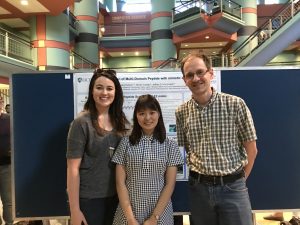
Poster Presentation
On Wednesday, we held a poster presentation. As I said before, I had an opportunity to present in front of my lab members ahead of that. Giving a presentation in English is quite difficult for me in case the audience are all foreigners even though I was not used to presenting in Japanese. I am taking classes to give presentations in English now in at my university, and thanks to this experience, I have great confidence in speaking English in public. I feel it is rather fun.
During the poster presentation, many people showed an interest in my research theme. There were many anticipated questions, thus I confirmed that good presentations need a lot of time for preparation and practice. However, when I convinced people who were not familiar with my study of what is already common for me, it was difficult to guess why and what part of the topic they did not understand.
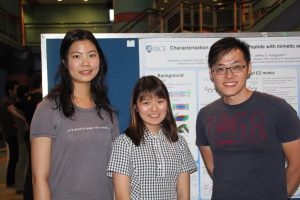
It was very hard to summarize what I had learned for five weeks, explain it briefly and make it comprehensive even for people who were unfamiliar with my study. Even when trying to explain it more clearly, I ended up repeating the same words and explanations, and I could not convince the non-expert audience enough sometimes. There are many reflection points, therefore for next time, I will surely be more confident in presenting more understandably.
Everyone said I looked very nervous when I presented in the practice session or in front of everyone in the lab. I was told that I should enjoy ot more. I think this was from my lack of confidence. Originally, I am not good at talking in front of people in any language but now I am convinced that I will be able to present more confidently next time through these experiences.
Actually, in my presentation class now, I willingly introduced myself first of all the classmates. I was told by the teacher that “You are not nervous but full of confidence. It’s wonderful.” It was a moment when I felt my growth from myself two months ago who could not even ask questions in public. I felt I’ve accomplished a lot. From now on, I will try my best to improve in all the abilities that must be needed in my future.
All the professors from the universities for Part II program showed an interest for my research theme. I definitely could do my best for 90 minutes. And I’m so glad to show off everything which I’ve learned during the past five weeks. The most impressive thing was that my professor, Prof. Hartgerink, said I’ve done great job, and that if I want a recommendation letter for my Ph.D., to definitely let him know. At last, he gave me a high-five. I am greatly honored by his words.
I will definitely keep making efforts even after going back to Japan so that I can meet the lab members again someday.
Final Research Project Update
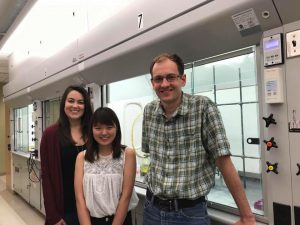
Final Research Project Title: “Characterization of Multidomain Peptide with Mimetic Sequences” (PDF)
Host Lab: My host lab is Hartgerink Research Group
Host Professor: Jeffrey D. Hartgerink
Mentor: Nicole Carrejo
Introduction: First, I’d like to talk about what Multidomain peptides are. Multidomain peptides are called MDP for short. Basically, MDPs are capable of self-assembling to form hydrogels. Hydrogels are soft materials which having the properties of both liquid and solid. It contains 1% peptide and 99% water. We find it is useful to deliver molecules or drugs because it has no harm and easy to make and handle.
MDP consists of neutral amino acid repeats and the charged peptide at each end. It has also β-sheet secondary structure. The most basic MDP is K2(SL)6K2 which is called K2. K means Lysine, S means Serine and L means Leucine. MDP contains alternating hydrophobic and hydrophilic amino acids, and the structure of that trigger β-sheet with hydrophobic amino acids on the one side and hydrophilic amino acids on the other side. Then, it can make hydrophobic sandwich by hydrophobic effect. By hydrogen bonding, hydrophobic sandwich is forming nanofibers. Because of the charge of peptides when inserting ion opposite charged of peptides, it will crosslink and make hydrogels.
Next, I’d like to talk about what mimetic sequences are. They called mimic for short. A mimic is the short sequence of amino acids that mimic the function of protein called growth factor. Growth factors act to promote the cell function like cell growth and we are trying to make MDP hydrogel bioactive by attachment of mimic to MDP.
Research Approach: This time, I conducted the research with E2(SL)6E2 which is called E2. E2 mimic literally consists of E2 and mimic. E2 is also MDP as K2, but it has E which is Glutamine acid instead of K. E2 mimic is composed of 24 amino acids and I synthesized one by one from the right side. After synthesizing, I worked on the characterization of K2, K2 mimic, E2 as well as E2 mimic to compare the results of that.
By Mass Spectroscopy, we found the peptide I synthesized has the molecular weight 2519 + 24 which is the mass of the E2 mimic plus sodium. That means I successfully synthesized E2 mimic. Running CD and IR, we can see all the peptide including the other peptide has β-sheet secondary structure. Using Rheology, we found E2 mimic is forming hydrogels that can shear recover.
Results: I successfully synthesized E2 mimic and find it that it has the same characteristics as the other MDP.
Discussion: Previously, MDP is used for the model of diabetic wound healing with mice. Mimics are supposed to cause immune response. However, when we tried to inject K2 and K2 mimic, there are no differences on wound healing between K2 and K2 mimic. We think that’s because K2 in itself causes a large immune response so it covers up the mimic’s function. Otherwise E2 is known for causing no immune response.
Therefore, if we can see the immune response when E2 mimic is injected to mice, that can be considered as due to the mimic’s function. As shown by Rheology, it has exactly properties of hydrogel but much weaker than E2. If we could not see the immune response, I think that might be caused by weakness.
Future Research: We are going to inject E2 mimic to mice, and observe whether immune response occurs or not.
Conclusion: If the mimic’s function is turned out, we can find MDP in itself can be bioactive by attachment of mimic. Our ultimate goals are that we make MDP be able to not only deliver something but also promote cell function. It will produce tremendous therapeutic benefits.
Question of Week
Until I participated in this program, I had not known about the poster presentation. I think the most popular type of the presentation is performed by power point in Japan. Is the poster presentation the most popular one in the U.S.?
- In science and engineering, it is most common for undergraduates and young graduate students to be invited to give a poster presentation at an academic conference. To give an oral talk, with a PPT, at an academic conference you first have to write a paper and it can take a long time to get results sufficient for this. So, most students begin their graduate research careers by presenting posters at conference and then advance up to oral talks/paper presentations as they gain more expertise in the field.
- It does vary by student/project though some and U.S. students also receive a lot of training and opportunities to give PPT presentations in classes and other campus events. For example, in November Rice University will host the Gulf Coast Undergraduate Research Symposium and a number of the 2017 U.S. Fellows have been invited to give oral presentations (PPTs) based off of their summer research projects in Japan. They can then use their poster as a starting point to develop their PPT presentation for this conference.
- Graduate students in Japan also often give poster presentations at academic conferences. When you join a lab in Japan you might want to ask the graduate students about their experience presenting posters as well. For more on this see our Presentation & Poster Development page.
Week 07: Visit to Lehigh University & Return to Japan
On Thursday, we were off to the East coast. Actually, I was born in New Jersey. Philadelphia and Bethlehem which we visited this time are very close New Jersey, thus I felt at home somehow. And I’d never thought those towns were such beautiful places, I really amazed with how romantic they were. Lehigh University has a beautiful campus which made me feel like being in the movie. Our staying there was limited to only two days, so I will definitely want to visit my birthplace to trace my roots one day.
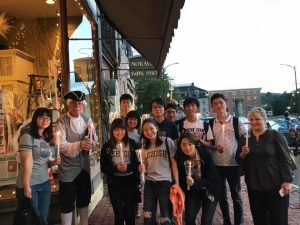
At Lehigh University, a session on our personal strengths was held. The most interesting one of my five personal strengths was Woo. Woo stands for winning others over. According to the survey I enjoy the challenge of meeting new people and getting them to like me I’d never known that I had such a prospect so far, so I couldn’t fully understand whether it is truly my strength at first. However, thinking carefully, I realized that I had this property. I am on good terms even with a clerk at a convenience store at my university. Also, when I stayed in Seattle for a month to study English, my homie was a Taiwanese girl. I still keep in touch with her almost every day to share the experiences not only about the joys but also about painful things. I think that she is very attractive and she also relies very much on me. We are planning to go to Seattle together this coming spring.
This time staying in Houston, thanks to the helpful people of the lab, I was able to build a good relationship with them, moreover I think that is because I could have enjoyed meeting them as well. Since I realized this advantage of myself, I can now enjoy new encounters with people.
It was finally time to return to Japan. We had the opportunity to have breakfast with Mr. Ietsugu who is the Chairman of Sysmex. I properly reported what I had learned for the last six weeks and thanked him again for the successful completion of this internship.

After that, we took a tour of Sysmex Techno Park. The most impressive thing in this visit is the idea that there is no science before culture. Therefore, there is a beautiful Japanese garden in techno park. We scientists sometimes pursue theory too much, ignoring cultures, customs and people’s feelings. Science and technology has been developed by humans, so it must not to hurt human dignity though. In the past, I had thought cultures, languages, customs and social mechanisms were made by humans were changing and uncertain day by day while science was accurate. I had thought science had many more things worth learning.
However, I realized that this is totally mistaken. This visit further meant this idea.
I am relieved to return to Japan, but already miss Houston friends. In Japan, I also find opportunities to speak English and enjoy communication in English. I definitely want to back to the U.S. again.
Question of Week
The streets of Bethlehem were very beautiful and seemed quite different from Houston. I could not find the grocery store or hamburger shop around, so is the food culture different from Houston?
- Bethlehem is a much older city than Houston and the area you were walking around in was the historic old downtown. While, in the past, there may have been grocery stores there the shops are too small and don’t have the parking needed for modern day grocery stores. So, the grocery stores and other more day-to-day restaurants for people that live and work in Bethlehem are likely located in other parts of town and people will drive there from the neighborhoods where they live.
Final Report & Tips for Future Participants
Through this program, I was able to have many opportunities to talk with and take seminars by people who I would otherwise rarely meet through my personal connections.
For example, we took webinar delivered by Kei Koizumi who works at American Association for the Advancement of Science (AAAS). He said if we had complaints or protests of government’s policy for studying science, we should search for those who cause the problems, write letters and express our thinking.
I didn’t know the education system in Japan or the U.S. much. I was ashamed of myself and become eager to know that more deeply. Currently, I have become interested in politics, so I read newspaper positively. I believe I could manage to change my mind like this way due to his impressive advice. His words were very strong and inspired me a lot because he was a person who totally knew Science for Policy & Policy for Science. In this way, I think it is one of the greatest feature of this program that we could learn not only scientific study but also all over the field.
I think it is essential that we experience how the lab life is going in the U.S. when we are sophomore or junior students because we usually have not decided for our future vision at that time. The experiences we got through this program must be helpful for the lab life in Japan started from senior and good opportunities to think about our course and career.
As we tried to not only to communicate with people about ordinary life but also discuss about our research or specialized fields in English in the U.S., we could imagine and think about what studying or working abroad is more clearly.
I was a visitor this time, so I am eager to conduct research as a member of the lab for the next time. I have become really active for learning and experiments of my major study to achieve that goal.
I heard the number of Japanese students who are studying abroad is decreasing gradually. I think it is easy to stay inside the place which is comfortable. The research in Japan seems to be advanced especially in chemistry, so many students says the best way to study it in Japan. I agree with that partially. It is sometimes hard and need some extra efforts or to throw myself to new surroundings. Moreover, it usually needs much money. I know this is a challenge for some Japanese people.
However, I promise if you study abroad, I’m sure you will have a good experience, find new points about yourself and can broaden your perspective.
In the first place, if you want to say the research level of Japan is very high in your own words, you should explore and know the actual experience in foreign countries. This program has a lot of fulfilling support and promises an amazing learning community and encounters. When you hesitate to try, you should apply for this program daringly while you can do whatever you want. It may change your life due to seeing something new. As for me, I become confident of myself and changed my mind greatly.
My future goal is to “contribute myself to solving the problem that must be accessed on global scale”. This was somewhat vague before participation in this program but it has became clearer. I’ve become active during class and overcome my shyness and been able to ask questions and give opinions in public. I’ve become curious about many subjects such as how national political system is going on. Anyway, I highly recommend that you should be out of your hometown and seek something new.
Tips for Future Participants
I’m not a good English speaker like the other Japanese fellows so I sometimes had trouble saying what I wanted to say in English and was disappointed at my lack of skill. However, I was inspired by the other students a lot and managed to learn various things.
In a group, there’re some kinds of roles. You’re needed to acquire not only fluency of English or width of knowledge. You should find your own advantage and make it your strength. If you were competitive with myself, you would absolutely enhance yourself.
Follow-on Project
It is sometimes hard to find the exchange program that fits you best on the internet. I have many friends who are interested in studying abroad like me. I’d like to recommend this program by talking about my experiences with them. This amazing program has not been known well yet. Information sessions about studying abroad are held often in my university. I’d like to coordinate with office and try to present on Nakatani RIES and help make it famous.
Final Question of the Week
We mainly stayed at Houston this time, and I was impressed with their friendliness and felt comfortable about living there even if we were Japanese. To the contrary, while we were in the east coast, I could not see many Asians. Is there any difference among cities in the U.S. about the attitude for accepting foreigners?
- Yes, some. In general larger cities in the U.S. are more diverse and have more newcomers (both Americans moving from other places and foreigners immigrating to that city). Smaller towns and more rural areas tend to be less diverse and have more ‘locals’; people who have lived there their entire lives.
- So, sometimes, these smaller towns and rural areas are less accepting of ‘outsiders’ (both other Americans and foreigners) but overall Americans are very friendly and like meeting and becoming friends with new people. It’s maybe similar to small towns and villages in Japan; until they get to know you they aren’t sure about you since everyone else is someone they may have known their entire lives.
- The culture or feeling or openness or diversity of a town/city/region does vary across the U.S. but I think this is true of any nation too. What is always true is that even in a rural or small town, a college or university campus is likely to be the most diverse location there since there will be students and professors from all around the world. So even if the school you attend is in a small town in the U.S., you may still be working alongside people from around the world.
